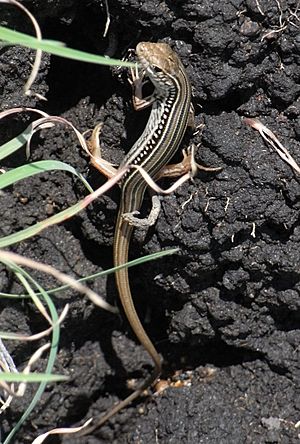Ctenotus facts for kids
Quick facts for kids Ctenotus |
|
|---|---|
 |
|
| Ctenotus robustus, robust striped skink | |
| Scientific classification |
|
| Kingdom: | Animalia |
| Phylum: | Chordata |
| Class: | Reptilia |
| Order: | Squamata |
| Family: | Scincidae |
| Subfamily: | Sphenomorphinae |
| Genus: | Ctenotus Storr, 1964 |
| Species | |
|
About 100, see list. |
|
Ctenotus is a group of skinks. Skinks are a type of lizard that belong to the Scincidae family. This group of lizards is part of a larger family tree, or clade, that includes other skinks like Anomalopus and Eulamprus.
These lizards are often called comb-eared skinks. This name comes from the special scales near their ears that look like tiny combs. Ctenotus lizards are very fast. They can disappear quickly when you are watching them! They are also very active, always looking for food in many different places.
You can find Ctenotus skinks all over Australia. They are especially common in dry areas and the tropical northern parts. In some places, they make up a big part of all the lizard species. For example, in one part of the Great Sandy Desert, about a quarter of all lizards are Ctenotus skinks. You might even find up to six different kinds of Ctenotus on a single sand dune! There are 23 species in the Southwest Australia region alone. These skinks come in many sizes, from very small to medium-large. Their bodies also vary, from thin to chunky. This wide variety means different Ctenotus species can live in the same area without competing too much for food or space.
Discovering Ctenotus Species
Ctenotus is the most diverse group of reptiles in Australia. There are about 100 different kinds, or species, of Ctenotus skinks. It can be quite hard to tell them apart! Even though there are so many, scientists are still learning a lot about them.
Some Ctenotus Species
Here are a few examples of the many Ctenotus species:
|
|
Nota bene: If a scientist's name is in parentheses after a species name, it means that species was first described under a different group name. Later, it was moved to the Ctenotus group.
- Storr GM (1964). "Ctenotus, a New Generic Name for a Group of Australian Skinks". Western Australian Naturalist 9 (4): 84-85.
See also
 In Spanish: Ctenotus para niños
In Spanish: Ctenotus para niños
 | Shirley Ann Jackson |
 | Garett Morgan |
 | J. Ernest Wilkins Jr. |
 | Elijah McCoy |

